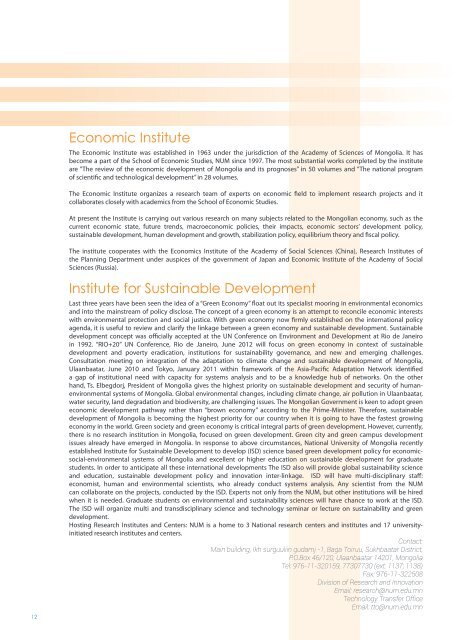NATIONAL UNIVERSITY OF MONGOLIA
NATIONAL UNIVERSITY OF MONGOLIA
NATIONAL UNIVERSITY OF MONGOLIA
Create successful ePaper yourself
Turn your PDF publications into a flip-book with our unique Google optimized e-Paper software.
Economic InstituteThe Economic Institute was established in 1963 under the jurisdiction of the Academy of Sciences of Mongolia. It hasbecome a part of the School of Economic Studies, NUM since 1997. The most substantial works completed by the instituteare “The review of the economic development of Mongolia and its prognoses” in 50 volumes and “The national programof scientific and technological development” in 28 volumes.The Economic Institute organizes a research team of experts on economic field to implement research projects and itcollaborates closely with academics from the School of Economic Studies.At present the Institute is carrying out various research on many subjects related to the Mongolian economy, such as thecurrent economic state, future trends, macroeconomic policies, their impacts, economic sectors’ development policy,sustainable development, human development and growth, stabilization policy, equilibrium theory and fiscal policy.The institute cooperates with the Economics Institute of the Academy of Social Sciences (China), Research Institutes ofthe Planning Department under auspices of the government of Japan and Economic Institute of the Academy of SocialSciences (Russia).12Institute for Sustainable DevelopmentLast three years have been seen the idea of a “Green Economy” float out its specialist mooring in environmental economicsand into the mainstream of policy disclose. The concept of a green economy is an attempt to reconcile economic interestswith environmental protection and social justice. With green economy now firmly established on the international policyagenda, it is useful to review and clarify the linkage between a green economy and sustainable development. Sustainabledevelopment concept was officially accepted at the UN Conference on Environment and Development at Rio de Janeiroin 1992. “RIO+20” UN Conference, Rio de Janeiro, June 2012 will focus on green economy in context of sustainabledevelopment and poverty eradication, institutions for sustainability governance, and new and emerging challenges.Consultation meeting on integration of the adaptation to climate change and sustainable development of Mongolia,Ulaanbaatar, June 2010 and Tokyo, January 2011 within framework of the Asia-Pacific Adaptation Network identifieda gap of institutional need with capacity for systems analysis and to be a knowledge hub of networks. On the otherhand, Ts. Elbegdorj, President of Mongolia gives the highest priority on sustainable development and security of humanenvironmentalsystems of Mongolia. Global environmental changes, including climate change, air pollution in Ulaanbaatar,water security, land degradation and biodiversity, are challenging issues. The Mongolian Government is keen to adopt greeneconomic development pathway rather than “brown economy” according to the Prime-Minister. Therefore, sustainabledevelopment of Mongolia is becoming the highest priority for our country when it is going to have the fastest growingeconomy in the world. Green society and green economy is critical integral parts of green development. However, currently,there is no research institution in Mongolia, focused on green development. Green city and green campus developmentissues already have emerged in Mongolia. In response to above circumstances, National University of Mongolia recentlyestablished Institute for Sustainable Development to develop (ISD) science based green development policy for economicsocial-environmentalsystems of Mongolia and excellent or higher education on sustainable development for graduatestudents. In order to anticipate all these international developments The ISD also will provide global sustainability scienceand education, sustainable development policy and innovation inter-linkage. ISD will have multi-disciplinary staff:economist, human and environmental scientists, who already conduct systems analysis. Any scientist from the NUMcan collaborate on the projects, conducted by the ISD. Experts not only from the NUM, but other institutions will be hiredwhen it is needed. Graduate students on environmental and sustainability sciences will have chance to work at the ISD.The ISD will organize multi and transdisciplinary science and technology seminar or lecture on sustainability and greendevelopment.Hosting Research Institutes and Centers: NUM is a home to 3 National research centers and institutes and 17 universityinitiatedresearch institutes and centers.Contact:Main building, Ikh surguuliin gudamj -1, Baga Toiruu, Sukhbaatar District,P.O.Box 46/120, Ulaanbaatar 14201, MongoliaTel: 976-11-320159, 77307730 (ext: 1137; 1138)Fax: 976-11-322508Division of Research and InnovationEmail: research@num.edu.mnTechnology Transfer OfficeEmail: tto@num.edu.mn


